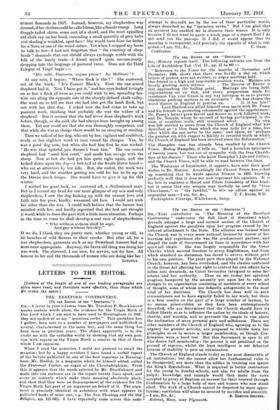[TO THE EDITOR OF THE SPECTATOR. '') Sin,—Ilistory repeats itself.
The following extracts are from the Life of Archbishop Tait (Vol. II., pp. 57 to 60) :- "Reference to the Times for the months of November and December, 1869, shows that there was hardly a day on which letters of protest were not written, or angry meetings held. . . . One friend in a high and responsible position wrote, Matters are hourly growing more serious. . . . The Diocese of Exeter is fast approaching the boiling point. Meetings are being held, organisations set on foot, and every preparation made for resistance. Can your Grace in any way interpose so as to prevent Gladstone pushing matters to an extremity ? He has chosen the worst diocese in England to practise on. . . . Is it too late?' . . . Lord Shaftesbury allied himself once again with Dr. Pusey and his friends in protesting vehemently against the appointment. Dr. Pusey's letters grew fiercer and fiercer as week followed week, and Dr. Temple, whom he accused of having participated in the ruin of countless souls, still remained silent. . . . No step was left untried to avert from the Church of England what was described as ` a blow from which she may rally for a time, but after which she can never be the same,' and again, as ` perhaps the greatest sin with respect to fidelity to revealed truth in which the Church of England has been involved since the Reformation.' "
The Hampden case has already been recalled by the Church Times. Bishop Hampden, it tells us, " had a harmless episcopate of twenty years, but was out of sympathy with the true Church- men of his diocese." Those who know Hampden's Life and Letters, and the Church Times, will be able to read between the lines.
The Wesleyans of Leominster, it appears, have sent their good wishes .to Dr. Henson. Accordingly the Church Times has raked up something that he wrote against Dissent in 1892, knowing perfectly well that it does not now represent his opinions. It is too late to engineer a Herod and Pilate friendship of this kind; but it seems that any weapon may lawfully be used by " true Churchmen," or " the faithful," to stir up odium against an
unpopular man.—I am, Sir, &c., T. F. ROTDB, B.D. Tushinghant Vicarage, Whitchurch, Salop.


























 Previous page
Previous page